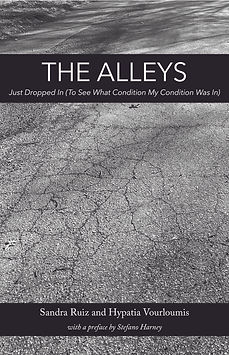

Sandra Ruiz (above left) is the Sue Divan Associate Professor of Performance Studies at the University of Illinois, Urbana-Champaign, the author of Ricanness: Enduring Time in Anticolonial Performance, co-author with Hypatia Vourloumis of Formless Formation: Vignettes for the End of this World, and creator of La Estación Gallery.
Hypatia Vourloumis (above right) is a performance theorist and co-author of Formless Formation: Vignettes for the End of this World (with Sandra Ruiz). She teaches at the Dutch Art Institute.
The Alleys: Just Dropped In (to See What Condition my Condition Was In)
by Sandra Ruiz and Hypatia Vourloumis,
preface by Stefano Harney
5.5 x 8.5, 162 pgs., $22
ISBN 978-1-962365-01-7
Order copies here, or
by writing to tim.roberts@np-press.org.
The Alleys: Just Dropped In (to See What Condition my Condition Was In) is a series of letters written between the collaborative duo Sandra Ruiz & Hypatia Vourloumis, co-authors of Formless Formation: Vignettes for the End of This World. Turning to the epistolary as a practice and mechanism for uncovering how thought, experience, and knowledge processes are inherently dialogic, Ruiz & Vourloumis place pressure on the regulatory infrastructures and conditions of individuation and exchange. Decentralizing and redistributing sites of sharing and connection, the book asks the reader/listener to travel down the narrowest of gatherings and passages known as the alleys—hidden planetary meeting spots and counter paths for correspondence and movement, both ephemeral and material, marginal and vital, everywhere and nowhere.
"In The Alleys, Sandra Ruiz and Hypatia Vourloumis show us—by way of letters to each other—how supposedly marginal sites, histories, ideas, and ways of being can connect us and form the vital infrastructure necessary for the emergence of new, more just worlds. As we have exhausted the possible (and become utterly exhausted with what is possible), it is in the alleys where we find routes to impossible futures that exceed the frames of capitalist exploitation and degradation. The alleys are spaces for gathering, conspiring, and being together that carry the undercurrent of explosive change. The Alleys invites us into the radical intimacy of Ruiz and Vourloumis’ friendship and reminds us that love is study and study is love." —Marisol LeBrón
"In this bundle of letters, Sandra Ruiz and Hypatia Vourloumis share with us their thoht-in-formation in the collaborative poetics of their experimental epistolary. With an old-school mode of address, they write in response to each other’s ruminations on aesthetics, writing, form, friendship, time, infrastructure, dispossession, crisis, and the intimacy of revolt. Showing us how thought wanders and flourishes in wandering, their bracing and innovative performance invites us to follow them down new alleyways of theory and possibility."
Shane Vogel
"Ruiz and Vourloumis’s The Alleys echoes with the radical question of what condition our
condition is in. Their moving letters take the political ontology of Formless Formations (2021)
toward a much-needed consideration of the infrastructural closures of racial capital
(Vishmidt, Harney) and the rhythmic temporalities and resonations of emancipatory
Undercommons (Harney and Moten). A kind of call and response between two brilliant
postcolonial feminist theorists of performance studies and the Undercommons, The Alleys
marks the political thresholds and affective openings needed to activate global anti-fascist
movements. Writing during the time of Covid and refusing the sovereign white subjectivity
of the neoliberal death sentences, they embrace the bodily reminder: 'I need to rest now.'
The temporal lags between their letters, the resonant rhythms between their paralanguages
(Vourloumis), the alleys they create in their multiple political ontologies all dramatize the
activist urgencies involved in the maintenance and care of life in the face of on-going anti-
Black, misogynoir, extractive, and anti-indigenous social death. They ask the reader to attend
to how we can experiment with and beyond the form of academic critique, in the
affirmation of a formless, deterritorialising revolutionary love. As epistolary, dialogic
counter-theorisation, as collective Undercommon study of our racial capitalist present and
past, The Alleys shifts our attention again to the patterned but unpredictable murmurations
of resistance. The Alley is brought to (non)dialectical perception as a time-space beyondbetween representation and metaphor, but always as an experimenting with the affects and embodiments of language, posing pragmatically what can an Alley do? What potentialities afford which actualisations when bodies are reconnected to what an Alley can do? Emergent through these at times touching, at times searing (often both together) letters is the
durational-affective, embodied, and decolonising attention to the Alley as uncanny and
paradoxical at once: with their attention to the non-natural tragedies of racial capitalism,
they offer the Alley as space of possible, potentializing, pre-figurative and emancipatory
politics, even as they recognise how racial capital moves to privatise the alley into another
kind of prison cell. Instead, from the Alleys Ruiz and Vourloumis gift us space-times of nonextractive relationality, postcolonial infrastructures, deterritorialisations of attention, queer kin-ship-ing, and radical care-support. As they drop in with each other through these
poignant letters, radically querying the condition their condition is in, and through engaging
modes of experimental writing, we abide in the potentialities and possibilities of becomings
within, against, and beyond racial capitalism. An Alley is always singular but as they show
resonances between alleys actuate the promise of monsters." —Amit Rai
"Using the epistolary form to share fleeting and glimmering possibilities of showing up, performance theorists Sandra Ruiz and Hypatia Vourloumis mark collaborative writing as an ephemeral yet persistent infrastructure of friendship, mutual attendance, and critical aesthetics in/for times of infrastructural necropolitics. Through a nuanced and heartfelt immanent infrastructural critique beyond and against a racial-colonial-capitalist logic, they take us through the trails and alleyways of Black, Brown, Indigenous, feminist, queer, diasporic epistemologies and struggles. This remarkably vibrant book guides us in thinking through the ongoing importance of reinhabiting these haunted alleyways as counterpublic passages for fugitivity, refuge, disorientation and transformative intimacy." —Athena Athanasiou